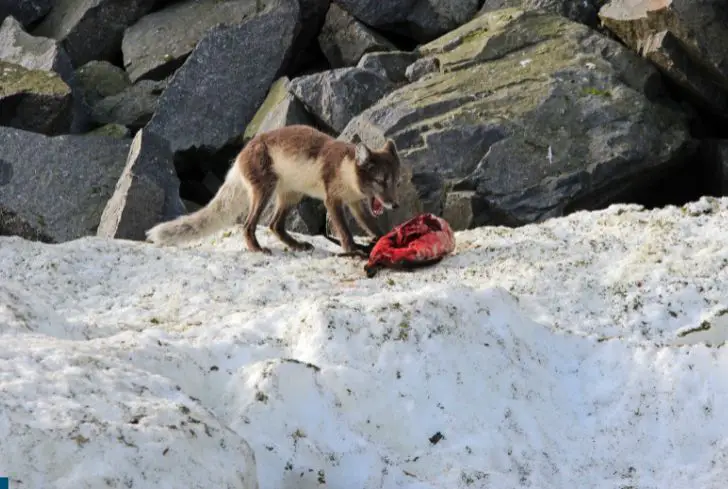Even if animals hunt and eat other animals, it does not mean that they cannot fall prey to another animal. It is the way wild animals and while the reality may not be pretty for us humans to think about; it is nature. Nothing you can do to change or stop it.
Two popular animals that humans sometimes encounter—especially in the garden—are foxes and badgers. Both are fearsome predators but can fall prey to another. In this article, we will try to discover if foxes eat badgers or vice versa.
Contents
Do Foxes Attack Badgers and Eat Them?
Foxes are clever animals that hunt their prey with ease, but badgers are not prey for foxes. These animals simply do not attack badgers or eat them. However, the same cannot be said for badgers.
Badgers are small, but temperamental little animals. They can get overly aggressive. If they are threatened or face competition for food, they will attack the other animal, which includes foxes.
Foxes and badgers share a diet so it is very possible they could encounter each other at some point. So, foxes will not attack badgers and eat them, but a badger will definitely attack a fox if it feels it needs to. They will also eat the fox because why waste food?
Are Foxes Afraid of Badgers?
It is easy to deduce that because badgers are so aggressive that foxes would take great pains to avoid such animals and give them a wide berth. It is because of this that the answer to the question is yes. Foxes are terrified of badgers and for good reasons. These fellow carnivorous animals will not hesitate to turn on a fox, kill them, and then feast on their carcass.
The best way foxes protect themselves from badgers is to just keep their distance. If a fox ever encounters a badger, you can bet that they do everything in its power to escape. If they did not do that, then the fox would just become another victim of the honey badger.
Do Foxes and Badgers Hunt Together?
Foxes and badgers do not hunt together. In fact, the animal that badgers can sometimes hunt with is a coyote, which is more dangerous than a fox. While foxes and badgers do not hunt together, they do have remarkably similar diets.
It is common for them to come across each other when they are hunting out in nature. Provided the badger is not provoked, these animals will simply go on their way and continue hunting for food.
Most of the time, foxes and badgers can live a peaceful existence with each other. Foxes are the ones that really push their narrative because, as we mentioned, they really do avoid badgers because of their overly aggressive nature. Luckily for them, most of the time it works and keeps them safe.
Badger vs Fox: Who Will Win?
If such a battle were to ever take place, the badger would easily defeat the fox. This has already been mentioned but let us reiterate foxes avoid and ignore badgers. They are not going to engage in such a fight when they would lose. Anytime fights do happen, it is the badger that started it.
Badgers are aggressive and they make the first move given they start the fight. While a fox is clever and could win against a badger, more often than naught, the badger is going to come out the victor. This is mostly because of its aggressive nature and strength.

Do Foxes and Badgers Hibernate?
First let us address whether foxes hibernate because of the cold weather in winter, which is an easy question to answer.
Foxes do not hibernate at all during the winter. One reason they do not have to hibernate is because of their thick winter coat that they grow during the winter. It lets them go out in the cold weather and hunt as they normally would. The snow just does not bother them and never did, anyway.
Now we will move onto whether badgers hibernate, another simple question to answer.
Badgers, like foxes, do not hibernate during the winter. They will slow down during parts of the winter and reduce their activity. This is not during the entire winter, but at certain parts of it. They tend to also accumulate a lot of body fat before winter, so they have no problem surviving during this cold period.
What do Foxes Prey on?
Foxes are omnivores, which means not only do they eat plant-based food, but they also consume meat as a part of their diet. Some animals they can hunt are small.
Foxes tend to hunt small mammals such as squirrels, rabbits, and mice. Other animals they can hunt are small birds, reptiles, frogs, fish, crabs, and mollusks. Worms, crickets, beetles, caterpillars, and earthworms are also a part of their diet during certain parts of the year.
The diet of a fox truly is everywhere and diverse. From our perspective, they eat a little of everything.
One can hope that they will not go hungry given that they have such a big choice in their food options. Fruit, meat, seafood, bugs, vegetables, etc. Really, the possibilities are endless for foxes and their versatile diets.
What do Badgers Prey on?
Although badgers can attack foxes and eat them, this is not their go to diet. Their actual diet is like a fox’s diet, with some differences here and there.
Like a fox, badgers eat rodents (including mice and rats), rabbits, lizards, snakes, and insects (which include earthworms like foxes tend to eat).
The following prey is unique to only badgers and not something a fox would typically eat as part of their diet. This includes hedgehogs (which is incredibly unique considering the little spikes on these creatures), scorpions (also unique given how dangerous these animals can be), slugs, and grubs.
It really should be no surprise that badgers would attempt to eat such animals, given how aggressive they can be. They would have no trouble taking down a scorpion or biting through a hedgehog.
If any animal can do it, a badger could do it.
What Animals Eat Badgers?
If there is one thing you, dear reader, have learned by this point in the article, it is that badgers are overly aggressive animals. For this reason, many animals try to avoid them, but despite their aggressive nature, they do have a few predators that prey on them.
Surprisingly, one of these animals is humans who tend to use them for their pelts or hunt them for sport. Their pelts are used in paint and shaving brushes, so this is one reason humans hunt them. Other animals that hunt badgers are coyotes (even if they do sometimes work together), bobcats, cougars, golden eagles, and bears.
It’s most common for cougars to hunt badgers out of the five. This does not mean the other animals will not hunt a badger, but it is not just quite common for them to do so. Only humans and cougars are the biggest predators in a badger’s life.
How to Keep Foxes and Badgers Away From the Garden?
While foxes and badgers might seem like interesting creatures, they can be a big problem for people who have a garden. Foxes and badgers are omnivores and will eat plants, fruits, and veggies, which are common in gardens. This makes a garden a perfect target. However, there are ways to deter these animals from going into your garden and destroying it.
Foxes tend to come out at night and good ways to deter them are:
1. Put motion sensor lights in your garden. It might spook foxes enough that they leave.
2. Chicken wire over plants is a good deterrent.
3. Prickle strips which are plastic coverings for your lawn. This will stop foxes from digging it up.
4. Finally, making sure you keep garbage bins and compost bins secured are a great way to keep them away. By locking it, they won’t have easy access and will move on somewhere else!
Badgers, like foxes, also come out at night. You can deter badgers with the following methods:
1. Like with foxes, motion sensor lights will do a good job of causing these animals to scurry off.
2. Wire mesh over plants will also keep badgers away.
3. Finally, natural scents like scotch bonnet spray is a great scent that will keep badgers away. Just spray it on your plants and you are ready!
Final Thoughts
So, now you know it is not foxes that attack and eat badgers. It is the other way around! Badgers are aggressive animals with few predators. Foxes and badgers tend to interact a lot because of similar diets, but usually they just avoid each other. If attacks happen, it’s the fault of the badger.
Hey, at least you can easily keep them out of your garden!







